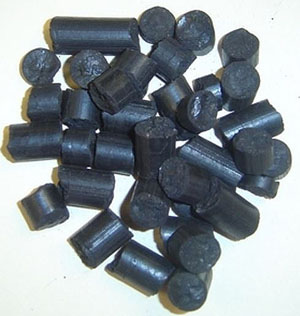Nippon Paper to Install Torrefied Pellet Demonstration Plant

According to a report this past week by
Biomass Magazine, Grand Forks, N.D., USA, Nippon Paper Industries (Japan) has signed a joint research and development agreement with Phoenix Pulp and Paper Public Co. (PPPC), a core company of SCG Packaging's (Thailand) Fibrous Business Chain, invested by Nippon Paper Industries in Thailand, on April 21. In the course of this joint research, they will install demonstration facilities in Thailand for the production of woody biomass fuel (torrefied pellets) using torrefaction technology along with the woody biomass resources that PPPC possesses.
Torrefaction refers to a type of technology for leaving a larger quantity of calorie than is left in normal carbonization by carbonizing woody biomass at a relatively low temperature. Torrefied pellets are superior to pellets made with only woody biomass (white pellets) or woody chips both in terms of water resistance and grindability. The increased density of energy leads to benefits such as reduced logistics costs.
Nippon Paper has decided to begin demonstrative production on a scale of 8,000 tpy in collaboration with PPPC. It will use the accumulated torrefaction technology and ultimately aim to commercialize it for market release.
The demonstration facilities for production will be installed on the premises of the mill of PPPC in the northeastern part of Thailand. They will utilize woody biomass as a raw material from the company-contracted forested site nearby. The facilities will begin production of torrefied pellets in spring 2017, with the plan being to ascertain the potential for commercialization around the end of December of the same year after a mixed combustion experiment with a pulverized coal boiler at Kushiro Mill (Kushiro, Hokkaido).
Nippon Paper Industries envisions installing commercial production facilities with a yearly production capacity of 80,000-ton when commercialization is realized. It will also do market research in Asia with Mitsui & Co. Demonstrative experiments are being conducted.
There is a global demand for woody biomass fuel as the renewable energy that can reduce carbon-dioxide emission. Domestic demand is also becoming higher in Japan.
In the future, torrefied pellets are expected to provide greater benefits than other types of woody biomass fuels. As a comprehensive biomass company shaping the future with trees, Nippon Paper Industries will work to commercialize operation technology for the stable production of torrefied pellets so as to expand the categories of the company's energy business Nippon Paper Industries focuses on from the supply of fuel to power generation.
TAPPI
http://www.tappi.org/
 According to a report this past week by Biomass Magazine, Grand Forks, N.D., USA, Nippon Paper Industries (Japan) has signed a joint research and development agreement with Phoenix Pulp and Paper Public Co. (PPPC), a core company of SCG Packaging's (Thailand) Fibrous Business Chain, invested by Nippon Paper Industries in Thailand, on April 21. In the course of this joint research, they will install demonstration facilities in Thailand for the production of woody biomass fuel (torrefied pellets) using torrefaction technology along with the woody biomass resources that PPPC possesses.
According to a report this past week by Biomass Magazine, Grand Forks, N.D., USA, Nippon Paper Industries (Japan) has signed a joint research and development agreement with Phoenix Pulp and Paper Public Co. (PPPC), a core company of SCG Packaging's (Thailand) Fibrous Business Chain, invested by Nippon Paper Industries in Thailand, on April 21. In the course of this joint research, they will install demonstration facilities in Thailand for the production of woody biomass fuel (torrefied pellets) using torrefaction technology along with the woody biomass resources that PPPC possesses.